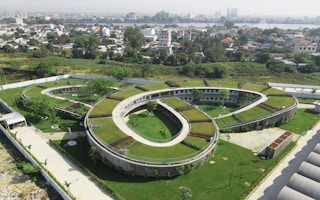The Vietnam Green Building Council (VGBC) has pulled out of the World Green Building Council (WorldGBC) after 14 years of membership. According to the WorldGBC, VGBC took the decision to cancel their membership in February 2021.
To continue reading, subscribe to Eco‑Business.
There's something for everyone. We offer a range of subscription plans.
- Access our stories and receive our Insights Weekly newsletter with the free EB Member plan.
- Unlock unlimited access to our content and archive with EB Circle.
- Publish your content with EB Premium.
VGBC was established in 2007 with the aim to raise awareness and build capacity for the development of green buildings in Vietnam. It is a programme derived from the Green Cities Fund, an international non-profit organisation based in California, United States.
The WorldGBC is a non-profit that promotes sustainability in the built environment around the world with over 70 green building councils, and VGBC is the equivalent organisation for the local market in Vietnam.
In Vietnam, buildings account for 17 per cent of the country’s fresh water consumption, a quarter of its wood harvest, 30-40 per cent of its energy production, and half of its raw materials. The country’s construction industry was growing at an annual rate of 9.6 per cent pre-Covid, and recorded a 5.7 per cent year-on-year growth in 2020. It was Asia-Pacific’s fastest growing construction market during the pandemic.
“Green Building Councils around the world face a variety of challenges. Unfortunately, Vietnam GBC has had to take the decision to leave the WorldGBC membership in order to focus on internal efforts in strengthening their business within their market. While we were saddened to lose this valued member, we look forward to welcoming them back again soon,” said Cristina Gamboa, chief executive officer of WorldGBC.
Although Eco-Business approached Vietnam Green Building Council for the reasons behind leaving, the spokesperson declined to comment. They said that the VGBC board of directors is in the midst of working with the WorldGBC to update the strategy with a plan to rejoin in the coming months.
WorldGBC said that they “continue to engage in positive conversations with the board members of VGBC and are supporting their efforts to grow their organisation and assist them in rejoining as members.”
According to an industry source, WorldGBC membership fees, which range from US$1,500 to US$25,000 depending on a member’s annual revenues, are a common point of contention. The benefits of membership include participation in regional projects and access to tools and resources.
In Vietnam, green buildings are able to obtain several different types of certifications, including US Green Building Council’s LEED, Singapore Building and Construction Authority’s Green Mark, and VGBC’s LOTUS certification.
The LOTUS rating system is exclusively for buildings in Vietnam, and includes adaptation and mitigation as a key criterion as the country has been ranked among the top five countries likely to be most affected by climate change.
According to the VGBC, the number of both LEED and LOTUS-certified green buildings in Vietnam is modest at 113 buildings, with 165 buildings currently undergoing the certification process.
In 2018, the Vietnam Urban Green Growth Development Plan 2030 was approved by the Prime Minister to promote urban economic development towards green growth, improve resilience to climate change and reduce greenhouse gas emissions. Vietnam’s urbanisation rate — that is, the proportion of the population living in cities — was 36.6 per cent in 2019 and is expected to reach 51.2 percent by 2040.










